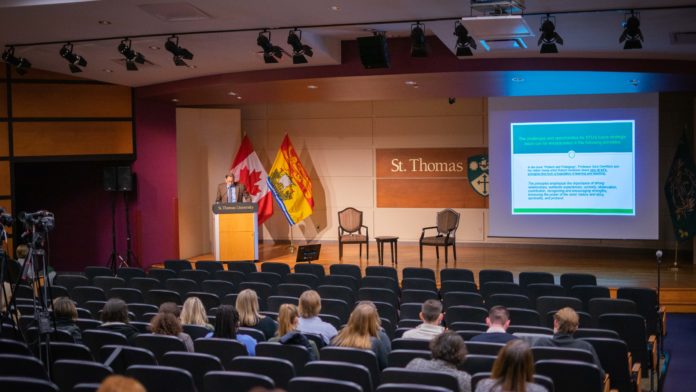
Nauman Farooqi, candidate for president and vice-chancellor of St. Thomas University, gave his presentation on Dec. 5 at the Kinsella Auditorium.
Ian Sutherland, also a candidate for the role, gave their presentation on Dec. 6.
Related: Sutherland gives presentation on candidacy for STU’s presidency
Farooqi was a professor and dean of business and social science at Mount Allison University for 22 years. He said his background is not traditional for the position, as he has always been in academia instead of administration.
Still, he said he sees leadership as being the conductor of an orchestra, which entails understanding how the instruments work.
“Essentially, a conductor knows when to call different people in his orchestra to join in creating music, not noise,” he said. “Hopefully, I’ve been creating a symphony over the last several years.”
Farooqi added that he was an “accidental academic” who started a degree in chemical engineering and ended in accounting.
When he was pursuing his PhD, his father passed away and he had to take care of his company. He said having to run the company showed him how essential it is to link theory with practice.
“As far as the employees were concerned, my sole qualification was that I was the boss’ son,” he said. “I realized that it’s really important to work really hard to earn trust and to build bridges.”
Related: EXPLAINER: Meet the two candidates vying for STU president, vice-chancellor
He said he identified STU’s financial position, recruitment and retention of students, reconciliation of Indigenous Peoples and faculty resources as the university’s main challenges.
Farooqi also highlighted the importance of having a strategic plan to make the university a more competitive liberal arts institution.
“There’s a lot that can be done in order to really showcase what is good about the university … that would lead to a greater recognition … and create a stronger brand identity.”
He said milestones, benchmarks and feedback is the best way to measure the plan’s success. He said connecting with departments and student clubs provides the university with perspective.
“Benchmarks allow us to measure how we stack up and compare with respect to our competition,” he said.
Farooqi said students’ concerns need to be addressed, especially regarding hands-on learning.
“They want to be co-creators, they don’t want to be pushed content,” he said.
“Fifteen years ago, I initiated and launched a new course on entrepreneurship and new venture creation … students in that course set up a real living company.”
He emphasized pillars such as strong relations, authentic experiences, curiosity, observation, contribution, recognizing and encouraging strengths, honouring the power of the mind, history and story, spirituality and protocol.
“Students are really excited to launch an enterprise,” he said. “They make their own decisions and run the company.”
Farooqi said other concerns such as STU divestment of fossil fuel need to be gradual.
“We can set a target … I think that’s a doable strategy. That’s a strategy that’s more pragmatic in its approach,” he said.
